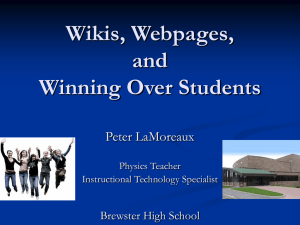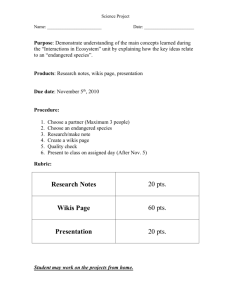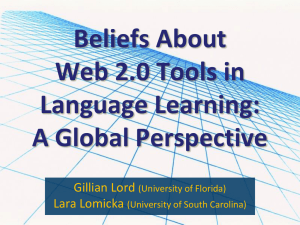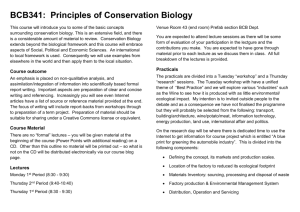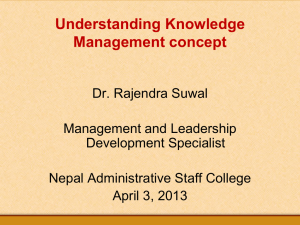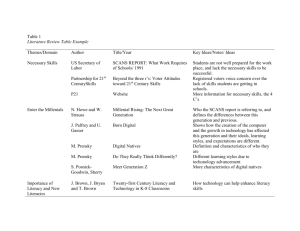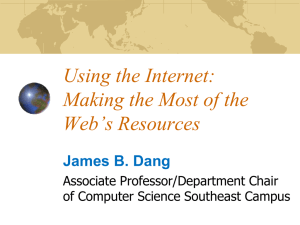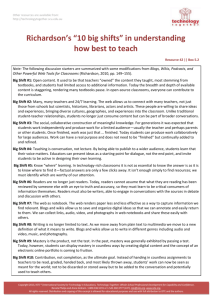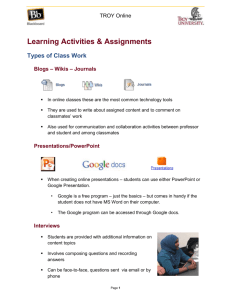Lucy_Mathers - Higher Education Academy
advertisement
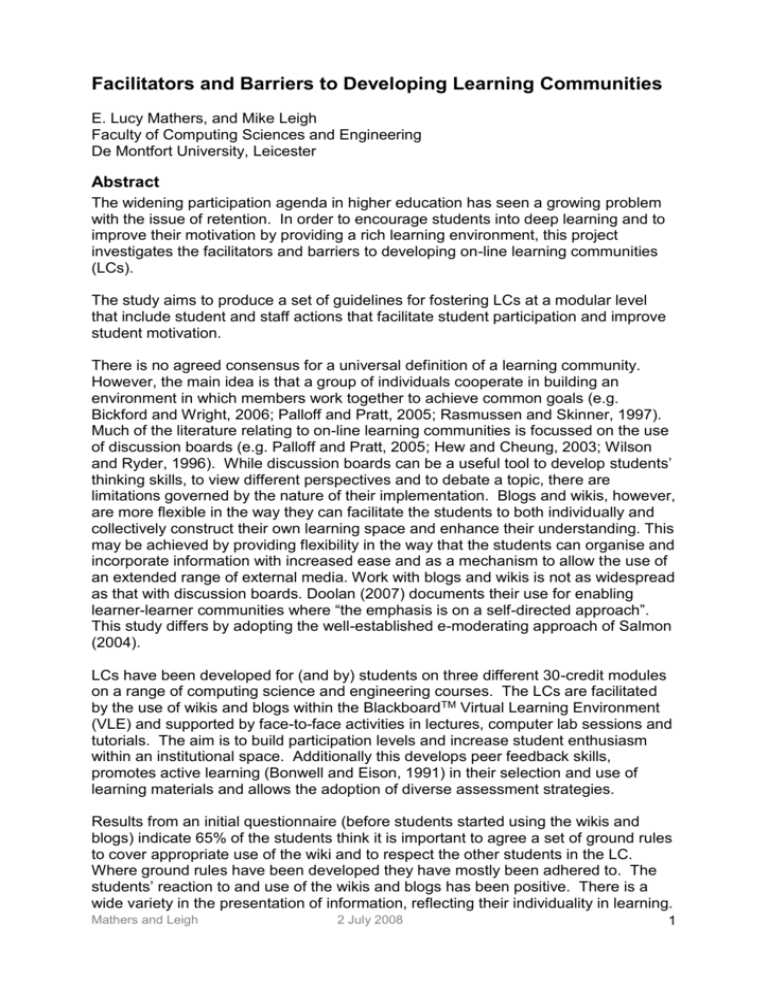
Facilitators and Barriers to Developing Learning Communities E. Lucy Mathers, and Mike Leigh Faculty of Computing Sciences and Engineering De Montfort University, Leicester Abstract The widening participation agenda in higher education has seen a growing problem with the issue of retention. In order to encourage students into deep learning and to improve their motivation by providing a rich learning environment, this project investigates the facilitators and barriers to developing on-line learning communities (LCs). The study aims to produce a set of guidelines for fostering LCs at a modular level that include student and staff actions that facilitate student participation and improve student motivation. There is no agreed consensus for a universal definition of a learning community. However, the main idea is that a group of individuals cooperate in building an environment in which members work together to achieve common goals (e.g. Bickford and Wright, 2006; Palloff and Pratt, 2005; Rasmussen and Skinner, 1997). Much of the literature relating to on-line learning communities is focussed on the use of discussion boards (e.g. Palloff and Pratt, 2005; Hew and Cheung, 2003; Wilson and Ryder, 1996). While discussion boards can be a useful tool to develop students’ thinking skills, to view different perspectives and to debate a topic, there are limitations governed by the nature of their implementation. Blogs and wikis, however, are more flexible in the way they can facilitate the students to both individually and collectively construct their own learning space and enhance their understanding. This may be achieved by providing flexibility in the way that the students can organise and incorporate information with increased ease and as a mechanism to allow the use of an extended range of external media. Work with blogs and wikis is not as widespread as that with discussion boards. Doolan (2007) documents their use for enabling learner-learner communities where “the emphasis is on a self-directed approach”. This study differs by adopting the well-established e-moderating approach of Salmon (2004). LCs have been developed for (and by) students on three different 30-credit modules on a range of computing science and engineering courses. The LCs are facilitated by the use of wikis and blogs within the BlackboardTM Virtual Learning Environment (VLE) and supported by face-to-face activities in lectures, computer lab sessions and tutorials. The aim is to build participation levels and increase student enthusiasm within an institutional space. Additionally this develops peer feedback skills, promotes active learning (Bonwell and Eison, 1991) in their selection and use of learning materials and allows the adoption of diverse assessment strategies. Results from an initial questionnaire (before students started using the wikis and blogs) indicate 65% of the students think it is important to agree a set of ground rules to cover appropriate use of the wiki and to respect the other students in the LC. Where ground rules have been developed they have mostly been adhered to. The students’ reaction to and use of the wikis and blogs has been positive. There is a wide variety in the presentation of information, reflecting their individuality in learning. Mathers and Leigh 2 July 2008 1 It has been found that within the wikis students are commenting on and providing constructive criticism of others’ work, and are also very encouraging towards their peers. Wiki use was observed to be most prolific when students were working on the assessment tasks but general discussion about module topics has been limited. This paper will start with a brief overview of the study and of the research tools adopted within an action research approach. The main focus will be on the facilitators, barriers and transferability of the LC model, resulting in guidelines for pedagogically sound wiki use. This will include a discussion on the different assessment strategies adopted, including the integration of self- and peerassessment on one of the modules. Feedback collected via the blogs & wikis and results of two dedicated questionnaires provide the student perspective. The staff perspective has been collated through questionnaire and the use of an electronic voting system at an e-learning symposium. The paper will conclude with a discussion on the important elements for good use of wikis: ownership, content, interaction and synergy. Introduction This research project stemmed from the aims to find new ways to engender a deep learning approach by students and to enrich the student learning experience through the use of technology. VLEs such as BlackboardTM are often used as a content management system and, as such, are often blamed as the cause of poor attendance at lectures. With the addition of new Blog and Wiki tools into VLEs, the opportunity was taken to explore their capabilities in developing online LCs within modules. This study considers online LCs as mechanisms to: provide a forum for discussion with student provided content facilitate peer feedback provide a space for students to build a “personal learning landscape”, i.e. construct their own knowledge. The main aims of the project are to: engender a deep learning approach enrich the student learning experience The objectives of this paper are to communicate the work of the project in terms of: the facilitators and barriers to developing online LCs within modules guidelines for good use of wikis underpinned by pedagogical approaches the transferability of the online LC model appropriate assessment strategies that can be used with online LCs Module Information Multimedia Animation Production 2 (Level 2, 30-credit module) The learning outcomes for the module are: to be able to design and evaluate multimedia interfaces for implementation of a multimedia production. Mathers and Leigh 2 July 2008 2 to be able to produce a time-based multimedia production incorporating animation techniques. The module is based around the coursework assessment: individual production of a multimedia application. The students are guided through stages of the multimedia production process (e.g. England and Finney, 2007) supported by lectures and computer laboratory sessions. The students were randomly allocated into “review” groups to provide peer feedback and support throughout the coursework process, specifically during the design stages (Figures 1a, b). Figure 1. a) The coursework process (draft, review, revise, evaluate & reflect cycle); and b) The coursework assessment process for the module Multimedia Animation Production 2. Object-Oriented Systems Analysis & Design (Level 2, 30-credit module) The main learning outcome for the module is: to be able to adopt a process to produce analysis and design models (UML) from a given case study. This module incorporates two coursework assessments based upon a case study: one focuses on analysis and the second on design, adopting an industry standard development methodology. After the first coursework, a specimen set of analysis documents are provided so that students are all working from the same starting point for their design phase. The coursework is a group submission, so the students work in a team environment that mirrors system development teams commonly found in industry. It was intended that the wikis would be used to discuss module topics, prepare system models and documents and as a project management tool for the coursework assessment (Figure 2). Mathers and Leigh 2 July 2008 3 Figure 2. The coursework and assessment processes for the modules Object-Oriented Systems Analysis & Design and Information Systems Development. Information Systems Development (Level 1, 30-credit module) The learning outcomes for the module: to be able to apply appropriate techniques to produce a requirements specification and design for a constrained case study, based on supplied information about user requirements to be able to apply practical systems development skills to implement a prototype system. The coursework and assessment processes are the same as those described for Object-Oriented Systems Analysis & Design, shown in Figure 2. While there are module-specific implementations that result in different use of wikis and blogs, there is a common philosophy underpinned by the 5-stage e-moderating model (Salmon, 2004). This describes the role of the e-moderator at various stages of the wiki development. This approach may be used to develop the higher-order skills in the cognitive domain of Bloom’s taxonomy (Bloom, 1956; Anderson and Krathwohl, 2001). Methodology An action research approach incorporating: a longitudinal study of students’ views using two questionnaires distributed at the beginning and end of the academic session, resulting in quantitative and qualitative data; a one-off survey of staff views (within the Faculty), the questionnaire contains some parallels to the student survey resulting in quantitative and qualitative data; use of the same staff questionnaire during a wiki session at an e-learning conference (Leigh, et al., 2008), resulting in quantitative data; observation / experience study resulting in both quantitative and qualitative data obtained from running the modules. Wiki and blog implementation At the outset, stages 1 and 2 (access, motivation and online socialisation) from the Salmon (2004) model were combined. Lectures provided the introduction, explaining Mathers and Leigh 2 July 2008 4 the rationale for using wikis. Small group sessions (labs or tutorials) were used to introduce in more detail what wikis are and how they may be used (Lefever, 2007). Introductory tasks (introduce yourself, establish a group identity in the wiki, discuss topics for coursework) were set for the students to carry out on the wiki. Technical support was provided through the use of example wikis and short guides (e.g. how to upload an image), as well as face-to-face support when problems arose. Students were also encouraged at this early stage to think about developing a set of ground rules for wiki use within their group. Student tasks for stages 3 and 4 (information exchange and knowledge construction) related either to initiating discussions on the module topics, or the coursework tasks. Tutor support was provided mainly by feedback lectures, where information from the wikis was downloaded by the tutor and discussed, and by demonstrating examples of good practice of wiki use. Stage 5 (development), where participants become more responsible for their own learning, was mainly in evidence on students’ individual reflective blogs. As stated by Salmon (2004), “… stage five often results in a return to more individual pursuits”. Individual evaluation and reflection was specifically designed into the assessment process. Additionally, wikis that can be accessed and modified by all students enrolled on the module were also created for a variety of reasons, including for exam revision. In comparison to the small group wiki use, little or no instruction, guidance, encouragement or marks were provided to the students for their use. Results and Discussion The student perspective To balance the observational study based around implementation of the wikis, as described above, a longitudinal study using two questionnaires of the students participating on the modules was conducted. The first questionnaire (see Appendix 1) was completed early in the session, while students had little or no experience with using wikis or blogs in an academic environment. The second questionnaire utilised the same questions (the tense of the questions were reworded) and was conducted towards the end of the session. Quantitative results from the questionnaire responses are provided in Appendix 1. Students were invited to make further comments about the use of wikis on the questionnaire forms. For the first questionnaire 31 comments were obtained out of a total of 143 returns, representing approximately 22% of the sample. For the second questionnaire 23 comments were obtained from 86 returns, representing approximately 27% of the sample. Mathers and Leigh 2 July 2008 5 Based upon the use of the wikis by the students and the results of the questionnaire, the discussion has been structured according to the following themes: Access to wikis, technical skills and issues Use of the wikis (ground rules, monitoring, frequency) Use of the wikis as an organisational tool Use of the wikis as an aid to learning / academic skills Access to wikis, technical skills and issues The majority of students felt satisfied that they had good access to the wikis. However, a number of comments were received on their use. A minority of students felt that the tools provided in BlackboardTM were limited, especially relating to the interface and the uploading of different media types and their quota. A few students also required technical help using the wiki throughout the module, even though this was provided both in an example wiki for the students to investigate, and in online user guides. However, most students were technically capable and presented content on their wikis using a wide variety of methods and media. Demonstration of good practice during face-to-face sessions gave other students knowledge of what is technically possible; modifications to wikis were undertaken after these sessions. Use of the wikis (ground rules, monitoring, frequency) Students agree that a set of ground rules is important for appropriate use of the wikis. A few students believe that they already know how they should behave in a public forum and as such to explicitly state ground rules on the wiki is not required. Quite a few comments were received via the questionnaires relating to frequency of use. Many students believed that wikis are of limited use unless they are regularly updated. Students want to know that the wikis are monitored, especially for accuracy of the content. Use of the wikis as an organisational tool Students commented on the usefulness of the wiki as a tool to organise group work, manage meetings, place content and receive feedback. Very few negative comments about this aspect of wiki use were received. A few students preferred to conduct their group work “as they had previously”. The interaction and synergy may have taken place at face-to-face meetings, yet the wikis were updated following the meetings with the resulting content and decisions. Use of the wikis as an aid to learning / academic skills Collaborative knowledge construction mostly took place in relation to the coursework tasks, suggesting that many students maintain a relatively shallow learning goal, i.e. what they need to do to pass the module. This is supported by the questionnaire results (Appendix 1) where > 40% of the students think marks should be awarded for wiki use. Towards deadlines wikis were enhanced in order to improve chances of a better mark. However, many tasks along the way were completed as a means to an end, with no immediate specified mark. Assessment is constructively aligned with learning outcomes rather than specific activities. In this way we have encouraged deep learning in our students: especially “teaching and assessing in a way that encourages a positive working atmosphere, so students can make mistakes and Mathers and Leigh 2 July 2008 6 learn from them.” (Biggs, 2003, p17). Despite different assessment approaches within modules, they focussed on students’ use of the wikis in terms of: Ownership – establishing a group identity and ground rules Content – choice of materials, presentation of content, quality of the content Interaction and synergy – communication methods and evidence of enhanced learning. Module summary statistics for the level 2 modules (Appendix 2) appear to support this view, at least for the Object-Oriented Systems Analysis and Design module. Results for Multimedia Animation Production 2 are inconclusive, primarily due to the small number of students undertaking the module during 2006-2007. The work contained in the evaluation and reflection was not of outstanding quality. However, many students had never written reflectively before and did articulate their thinking about important aspects of their learning. It is anticipated that introducing reflective writing at level 2 will result in higher quality evaluation in level 3 modules, especially the dissertation. In fact, it could be argued that reflective writing should be introduced earlier, at level 1 (Hay and Mathers, 2008). Cohort-level wikis resulted in very little use by the students and this brings up two points. The first is that students appear more comfortable in using the wikis in small groups where they are very encouraging of each other, and lack of knowledge is not seen as a problem. Secondly, the importance of the e-moderator role in providing suitable instructions and motivational factors in wiki use is highlighted. The staff perspective Staff opinions about the use of wikis and blogs in an online learning community environment have also been solicited through the use of a survey undertaken at an e-learning symposium (Leigh, et al., 2008), during a session on wikis and blogs. It should be noted that staff attending this session are either currently engaged in elearning activities or motivated to engage in e-learning activities, and will have interest in the educational use of wikis and blogs. The survey questions were also distributed in questionnaire form to staff within the Faculty of Computing Sciences and Engineering (CSE) who would consider themselves to be technically literate. Quantitative results from the survey and questionnaire can be found in Appendix 3. Nine comments (Appendix 3) were obtained from the CSE staff questionnaire out of a total of 21 returns, representing 43% of the sample. 43% of (non-CSE) staff feel they lack the technical skills to implement the wikis and blogs, yet are enthusiastic about including them in their teaching (76%). CSE staff feel they have the technical skills (71%), but are less sure about using the tools in their teaching (only 52% of the sample intend to). Many staff incorporate activities in their teaching that would be easily transferable, using wikis and blogs, yet 57% of the staff attending the symposium appear to be unsure of the pedagogy when it comes to the use of technology in this way. CSE staff are more confident with the pedagogical use of technology (only 38% are unsure). The majority of staff (>85%) believe that pedagogical support should be available when designing learning activities that utilise blogs and wikis. Mathers and Leigh 2 July 2008 7 48% of CSE staff perceive that the time required to assess work will increase when using blogs and wikis. Time needed for designing appropriate activities is viewed as an increase in workload and a barrier to implementing wikis and blogs into teaching. The lower percentage for CSE staff (57% compared with 75% for those at the symposium) is surprising as many CSE staff have very high teaching workloads. However, some of the comments reveal that a number of those surveyed already implement wikis and blogs. Conclusions This study was primarily an action research project with the main aims of implementing a transferable model using wikis and blogs to develop online LCs within a range of modules. It was intended to find means of helping both staff and students use the wikis to engender deep learning in an academic setting. The conclusions of the project are presented in terms of the facilitators and barriers faced by staff and students, guidelines for implementation of the e-moderating model (Salmon, 2004), and a discussion on assessment strategies. What are the facilitators and barriers? Appendix 4 contains a summary of the facilitators and barriers to using wikis and blogs to build an online LC within modules. It contains both the staff and student views drawn from the questionnaires and observations of use in the modules. Implementing online LCs needs to be core to the constructive alignment of the learning and assessment strategies of the module. Many staff have interactive group work and reflective components currently embedded within their teaching, yet are unsure of the pedagogical use of the technology. They have not recognised that wikis and blogs are just implementation tools, and feel that it is important to have pedagogical support available when designing and implementing online learning activities. Perceived lack of required technical skills is more of an issue for (non Computing Sciences and Engineering) staff than students even though they currently incorporate use of VLEs in their teaching and learning activities. Many tutors see setup time as a barrier to implementation within their own teaching because it is viewed as an additional task, rather than a change in their methods. Since they are on the whole enthusiastic in using web 2.0 tools, it is unclear whether or not this is related to pedagogical or technical concerns, or both. It is true that setup time for implementing wikis and blogs, especially the first time it is attempted, involves a learning curve. Engagement and motivation of the students using the wikis and blogs is difficult to assess. Students that were motivated to attend the face-to-face sessions generally engaged more with the module outside of class time. Students that did not participate in the face-to-face sessions often did not engage with the wikis and blogs. For the former group, this increased engagement appears to have led to improved grades, at least for the Object-Oriented Systems Analysis and Design module. For other modules this is less obvious as the assessment strategies have changed with the change to the use of wikis and blogs. Evaluations and reflections generally demonstrate a higher level of understanding of both module topics and learning styles. Mathers and Leigh 2 July 2008 8 Students generally believe they have sufficient skills to evaluate the academic worth of materials they post onto the wikis. However, this is not demonstrated in practice. It is recommended that appropriate study skills are embedded into the module, specifically in relation to evaluation of on-line materials. Guidelines The findings presented in Appendix 4 have been used to develop guidelines for implementing the online LC model. As is recognised good practice, all learning activities should be constructively aligned to the learning outcomes of the module. A staff-only wiki set up for tutors on a particular module or course could be used to build pedagogical and technical confidence. Produce back-up plans for important components should the technology be inaccessible. While technical issues are not seen as a concern for students, it cannot be assumed that everyone is technologically capable in a web 2.0 environment. It is important for students to get good support from the tutor at the outset; this may include example wikis created by the tutors and provision of user guides (e.g. for embedding different types of media). Good practice needs to be regularly promoted (e.g. through a face-to-face session) which can be used to increase motivation and participation, as well as to demonstrate technical possibilities. Use face-to-face sessions to deal with misconceptions of module topics and inappropriate use of the forum. Students should be encouraged to add (appropriate) personal information in order to aid the socialisation process and enable the students to practice with the technology before they start any real work. For example, “State why you chose to undertake this module / course of study”, “Add an avatar or picture of yourself to your wiki page”. Transferability of the online LC model Salmon’s (2004) e-moderating model was chosen to underpin the implementation of the online LCs because it was developed to be transferable. The strategy employed closely followed the stages in the model and worked well for modules with different learning outcomes as well as with different assessment mechanisms. Although there is some commonality among the three chosen modules in terms of analysing a problem and then designing and implementing a solution, it is felt that this strategy is transferable to other disciplines. For example, in the Dance: principles in practice module belonging to another faculty, it is essential that students engage in peer evaluation since they are unable to view their own performances as they occur. Self-evaluation and reflection is currently undertaken through the use of video. Evaluation and feedback takes place in a faceto-face activity, where personal opinions of the student can (and often do) bias the feedback (Hay and Mathers, 2008). The videos and the feedback mechanism could be placed within a wiki environment; the fact that all the work is in one location would make it easier for students to evaluate and reflect upon their achievements. Peers may also provide more considered evaluative feedback, as an immediate response is not required. Mathers and Leigh 2 July 2008 9 Assessment strategies While the learning outcomes and the assessment processes were different for all modules, the elements that were assessed of students’ use of the wikis and blogs were essentially the same: ownership, content, interaction and synergy, which are seen as indicators of good use for learning. The approach undertaken was to motivate the students by assigning marks to their use. It was found that a significant number of students are still marks-focussed. Moderation across the modules confirmed that, even though different assessment strategies were applied, the marks awarded for the four elements were comparable for students with similar levels of achievement. If wikis and blogs are to be used for developing an online LC, it is suggested that even if no marks are to be awarded, these are the important four elements that should be focussed on for successful use for learning. Concluding remark While Doolan (2007) recently adopted a student self-directed approach to implementation of wikis and blogs in developing online LCs, this study discusses the adoption of the e-moderating approach (Salmon, 2004). Similarly, the implementation described in this study contains different assessment strategies and differences in the activities conducted on the wikis for different modules. It is therefore argued that implementation method, as long as the activities conduced within that method are determined by constructive alignment (Biggs, 2003), is not the important factor in determining successful use of the wikis for learning. This study offers the following indicators of good wiki use: ownership of the wiki, discussion of content brought to the wikis (including presentation and quality), evidence of integration and synergy resulting in deep learning. References Anderson, L.W., and D.R. Hrathwohl (Eds.), 2001. A taxonomy for Learning, Teaching and Assessing: A revision of Bloom’s Taxonomy of Educational Objectives. Longman, New York. Bickford, D.J., and D.J. Wright, 2006. “Community: The Hidden Context for Learning” in Oblinger, D. (Ed.), Learning Spaces. Accessed (20/12/06): http://www.educause.edu/ir/library/pdf/PUB7102d.pdf Biggs, J.B., 2003. Teaching for quality learning at university. 2nd Ed., Open University Press, Maidenhead, UK. Bloom, B.S. (Ed.), 1956. Taxonomy of Educational Objectives, the classification of educational goals – Handbook I: Cognitive Domain, McKay, New York. Bonwell, C., and J. Eison, 1991. Active Learning: Creating Excitement in the Classroom. AEHE-ERIC Higher Education Report No. 1. Jossey-Bass, Washington DC. Available online. Accessed (11/6/08): http://www.ntlf.com/html/lib/bib/919dig.htm Doolan, M.A. 2007. Collaborative Student learning and the Role of the Tutor: Using online Web 2.0 technologies (Wiki) to enhance traditional face-to-face teaching and to improve the HE student learning experience. HEA Annual Conference 2007. Available online. Accessed (12/6/08): http://www.heacademy.ac.uk/assets/York/documents/events/conference/L5.doc Mathers and Leigh 2 July 2008 10 England, E., and A. Finney, 2007. Managing Interactive Media. 4 th Ed., Addison Wesley, U.K. Hay, M., and E.L. Mathers, 2008. Autonomous learning in the creative disciplines: the transition into and through HE, RITA workshop 1. De Montfort University, Leicester, UK, 4th April 2008. Hew, K.F., and W.S. Cheung, 2003. Models to evaluate online learning communities of asynchronous discussion forums. Australian journal of educational technology, v. 19, no. 2, Winter 2003. pp.241-259. Accessed (16/12/07): http://www.ascilite.org.au/ajet/ajet.html Lefever, L., 2007. Video: Wikis in Plain English. Common Craft LLC. Accessed (10/6/08): http://www.commoncraft.com/video-wikis-plain-english Leigh, M., E.L. Mathers, and J. Philpott, 2008. Using wikis to enhance group tasks. De Montfort University e-Learning Symposium. Leicester, UK, 16th May 2008. Palloff, R.M., and K. Pratt, 2005. Collaborating Online: Learning Together in Community. Jossey Bass, San Francisco. Rasmussen, G., and E. Skinner, 1999. Learning Communities: Getting Started. GateWay Community College. Accessed (20/12/06): http://www.mcli.dist.maricopa.edu/icl/monograph/ICL-Monograph.pdf Salmon. G., 2004. E-moderating, 2nd Edition. Taylor & Francis (Routledge). Summary of the 5 Stage Model available online. Accessed (9/6/08): http://www.atimod.com/e-moderating/5stage.shtml Wilson, B., and M. Ryder. 1996. Dynamic Learning Communities: an alternative to designed instructional systems. Submitted to Educational Technology Research and Development. Accessed (20/12/06): http://carbon.cudenver.edu/~mryder/dlc.html Acknowledgements This research was funded by De Montfort University’s Research Informed Teaching Awards for Excellence scheme. We would like to thank our colleagues and students for their support and feedback, especially those who undertook the questionnaires and surveys. Mathers and Leigh 2 July 2008 11 Appendix 1 – Quantitative results from Student Questionnaires Mathers and Leigh 2 July 2008 12 Appendix 2 – Module summary statistics Table 2-1. Object-Oriented Systems Analysis and Design module mark statistics No. of students on module >70 60-69 50-59 40-49 30-39 <30 2006 – 2007 2007 – 2008 150 102 10% 22% 18% 33% 27% 24% 21% 11% 13% 7% 11% 3% Table 2-2. Multimedia Animation Production 2 module mark statistics No. of students on module >70 60-69 50-59 40-49 30-39 <30 2006 – 2007 2007 – 2008 18 36 17% 3% 33% 33% 33% 25% 17% 28% 0% 3% 0% 8% Appendix 3 – Quantitative results from Staff Questionnaire and Electronic Voting Survey e-Symposium relates to the staff that conducted the electronic voting survey during a wiki session at the De Montfort University e-learning symposium (Leigh, et al., 2008). CSE staff relates to the questionnaire and comments (below) distributed to 21 members of Computing Science and Engineering staff. Mathers and Leigh 2 July 2008 13 Table 3-1. Staff comments Blogs/wikis are a good idea, but require particular thought from tutors and extra work to get students engaged. I consider Blackboard to be such a poor system that I avoid it. I can do better with my own web page / scripts. Q1. I offered this opportunity to final year project students. One or two started using the blogs then chose to use hard copies instead. Q4. Possibly due to occasional unreliability of Blackboard. Wikis are used on one module on which I teach, for students to collaborate, post up ideas, Q&A etc. – and gain credit later. They seem to work okay – students do use them. In general a mechanism for achieving an end that can be reached by other means, BUT beneficial if students are used to this technology and, therefore, more willing to engage. Pressure of work restricts my ability to explore and use this important technology. I already use wikis and blogs as key instruments for teaching and assessment. I haven’t used a wiki to date on Blackboard, but I have this year been exposed to their potential for project management – either individual or group. I intend to encourage final year project students to use wikis instead of blogs. I attended a course concerning blogs/wikis. If I hadn’t attended this I wouldn’t have considered using them in my teaching. Mathers and Leigh 2 July 2008 14 Appendix 4 – Summary table of facilitators and barriers in developing online learning communities from both the staff and student perspective. Facilitators Barriers Enthusiasm for incorporating new (web 2.0) technologies into learning activities Time required for assessment not seen as likely to increase Staff Seen to be an aid to engendering deep learning Interactive group work activities currently embedded in teaching Some staff perceive a lack of required technical skills Apparent lack of confidence in understanding pedagogy when applied to use of technology Requirement for pedagogical support when designing online learning activities Perceived increase in workload needed to design and implement online learning activities Unsure as to the usefulness of blogs and wikis in helping them to learn module topics Still a large number of students motivated by marks for using blogs and wikis Perceive themselves to have good evaluation skills for material selection (but not strongly evident in postings) Fewer students accept public forum for large group activities and prefer anonymous postings Student reflection exercises common in teaching Access to VLE not considered a problem for most students Required technical skills in place (but small barriers & need guidance at start) Students Public forum accepted for small group activities Generally adopt sensible approach to use of online forums and agree ground rules are important Most agree use of web 2.0 technologies is acceptable for academic use Mathers and Leigh 2 July 2008 15
